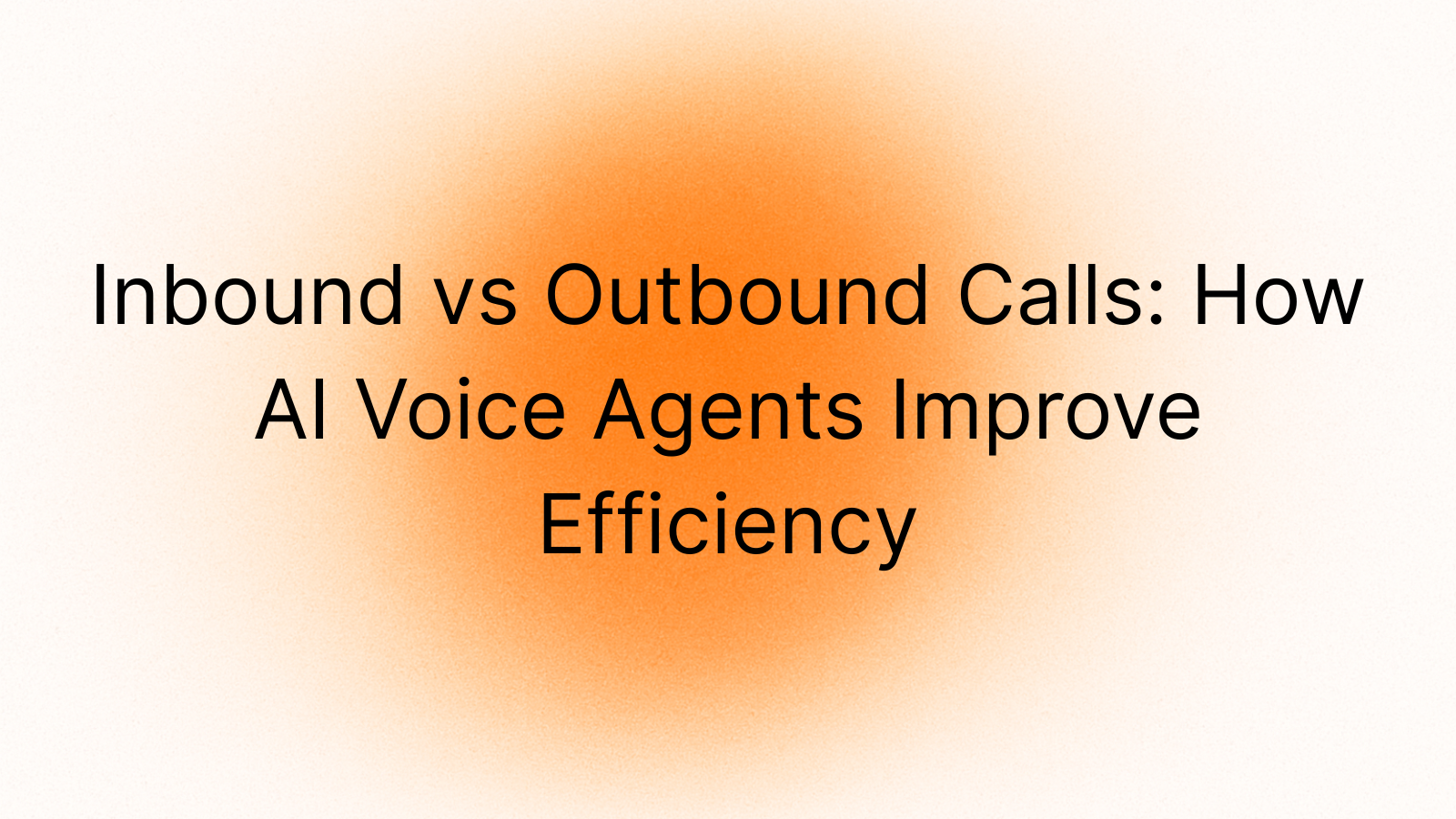Managing inbound and outbound calls is a critical aspect of customer relations. Businesses handle thousands of calls daily—whether from customers seeking assistance or as part of sales and outreach campaigns. However, traditional call centers face major challenges: high operational costs, staffing shortages, long wait times, and difficulties managing fluctuating call volumes
With the rise of AI voice agents, a new era is emerging. These intelligent virtual assistants automate significant portions of inbound and outbound call management, reducing wait times, enhancing operational efficiency, and improving customer satisfaction. But how can they be effectively integrated into business operations? This article explores the impact of AI voice agents on inbound and outbound calls and highlights the hybrid future where AI and human agents work together.
1. Understanding Inbound and Outbound Calls: Definitions & Challenges
Inbound calls are those that customers make to a business. These calls typically involve customer support, appointment scheduling, order tracking, or general inquiries. Efficient call handling is crucial for delivering excellent customer service and reducing frustration
Outbound calls, on the other hand, are initiated by the business to a customer or prospect. They are commonly used for sales outreach, debt collection, appointment confirmations, and customer satisfaction surveys. Success in outbound calling requires a targeted approach to maximize response rates while minimizing costs
Historically, both inbound and outbound calls were handled exclusively by human agents, leading to high costs, availability constraints, and dependence on workforce capacity. AI voice agents are now transforming this model by automating many of these interactions, helping businesses optimize their customer communication strategy.
2. How AI Voice Agents Are Enhancing Inbound Call Management
The Challenges of Traditional Call CentersBusinesses handling large volumes of inbound calls face several key issues
Long wait times: Understaffed call centers struggle to keep up with demand, leading to customer frustration
High operational costs: Hiring, training, and managing agents is expensive, especially in high-turnover environments
Fluctuating call volumes: Peaks in demand—due to seasonal trends, promotions, or service issues—can overwhelm call centers
Inconsistent customer experience: The quality of service varies based on the agent’s expertise and availability
How AI Voice Agents Improve Inbound CallsAI voice agents address these challenges by automating key aspects of inbound call management. Powered by advanced natural language processing (NLP), they can understand customer queries and provide immediate assistance without human intervention
An AI voice agent can
Handle unlimited calls simultaneously, eliminating long queues and wait times
Respond to frequently asked questions about business hours, pricing, and policies
Schedule and modify appointments by integrating with scheduling tools and CRMs
Qualify and route complex calls to the right human agent, ensuring faster and more efficient resolutions
By integrating AI-driven call handling, businesses can improve customer satisfaction while optimizing costs. Instead of waiting on hold, customers receive instant responses, and human agents can focus on more complex inquiries.
3. The Impact of AI Voice Agents on Outbound Calls
The Challenges of Traditional Outbound CallsOutbound calls—such as sales, follow-ups, and payment reminders—are often met with resistance from customers, making them difficult to execute effectively. Common challenges include
Low response rates: Many customers ignore calls from unknown numbers
Time-consuming processes: Agents waste valuable time dialing numbers and repeating scripts
Lack of personalization: Generic scripts fail to engage customers effectively
How AI Voice Agents Improve Outbound CallsAI-powered voice agents can enhance outbound call strategies by making campaigns more efficient and engaging. They can
Make thousands of calls simultaneously, significantly increasing outreach capacity
Target the right customers at optimal times, using CRM data for better engagement
Personalize conversations based on customer history and preferences
Automate follow-ups and reminders, ensuring key messages reach customers without manual effort
This automation enables businesses to increase conversion rates and efficiency while allowing human agents to focus on high-value interactions.4. Moving Toward a Hybrid Model: AI & Human Agents Working TogetherIntelligent Call Filtering for an Optimized ExperienceAI voice agents are not designed to replace human agents but to act as an intelligent filtering system that optimizes customer interactions. The hybrid model follows a structured approach
Level 1: AI Voice Agents → Handle routine inquiries, process simple requests, and qualify calls
Level 2: Human Agents → Manage complex cases, strategic interactions, and emotionally sensitive conversations
This model ensures that customers receive instant responses for routine queries, while human agents handle high-value conversations requiring expertise and empathy
Enhancing the Customer Experience with AIRather than viewing AI as a replacement for human support, businesses should leverage it to streamline customer service. AI voice agents provide instant responses for simple requests while seamlessly routing more complex issues to human representatives
This approach reduces frustration and wait times, creating a smoother, more personalized experience. As AI technology advances, businesses that adopt a hybrid AI-human approach will be better positioned to meet evolving customer expectations while optimizing operational efficiency.
Conclusion: AI Voice Agents Reshaping Inbound & Outbound Calls
The rise of AI voice agents in inbound and outbound call management represents a major shift in customer service. These solutions help businesses increase efficiency, lower costs, and enhance customer experience while reducing the workload on human agents
Instead of a full replacement, a hybrid model is emerging—where AI handles routine interactions and human agents focus on strategic, high-value conversations
At Rounded, we specialize in integrating AI-powered voice agents into call centers, helping businesses modernize their customer service strategies. Get in touch today to discover how Rounded can transform your call management!

